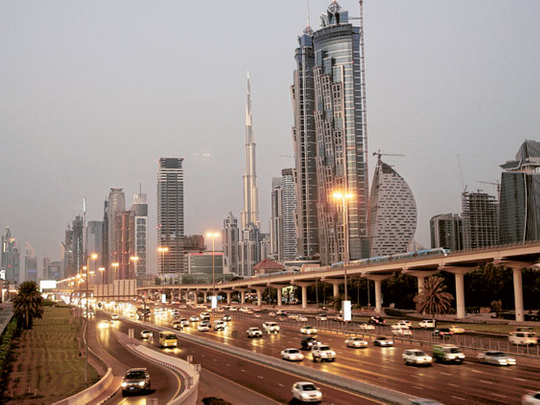
In late September, I visited Dubai as part of efforts to keep track of economic developments in the UAE. The visit provided me an opportunity to appreciate numerous signs all pointing out to steady economic progress in the emirate less than two years since the revelation of Dubai's debt. The global business community was shocked by the situation when it was uncovered in late 2009.
In reality, plenty of recently emerging evidence confirms the position of Dubai as an exceptional business hub within the Gulf Cooperation Council (GCC). Simultaneously, the facts substantiate Dubai's ability in overcoming challenges, no matter how difficult they may initially look like.
For instance, in September, Dubai Metro started operation of the Green Line of this pioneering project. The development means that all but two of the 47 stations are operational. In retrospect, the 29-station Red Line was opened for the general public in September 2009 not long before the revelation of Dubai's debt problem. Yet, much to its credit, Dubai succeeded in completing the project despite all odds.
Amazingly, Dubai Metro is the first urban train network in the Arabian Peninsula. True, other GCC cities like Doha have revealed plans for setting up local train networks, but that is yet to be a reality. In the words of a Western researcher who follows economic developments in the region, Dubai is at least 10 years ahead of its rivals when it comes to infrastructure development.
Nakheel profit
Undoubtedly, the project is popular with commuters in the city, as statistics indicate some 180,000 use the Red Line every day. The number of commuters, notably workers, stands to cross a quarter of a million with the commissioning of 16 out of 18 stations in the Green Line that include Dubai Healthcare City and Al Ghusais.
Another encouraging sign relates to Nakheel's announcement of a notable $234 million (Dh859.38 million) net profit in 2010. The announcement followed Nakheel's $16 billion debt restructuring, followed by issuance of Islamic bonds for creditors worth more than $1 billion. In retrospect, it was the revelation of Nakheel's delayed payment of a financial obligation that set the stage for Dubai's debt problem.
And just last week it emerged that a new oilfield should start production by the year end. The oilfield of Al Jalila is named after the daughter of His Highness Shaikh Mohammad Bin Rashid Al Maktoum, Vice-President and Prime Minister of the UAE and Ruler of Dubai. Once operational, the field will be the fifth of its kind since the discovery oil in Dubai in the 1960s.
Still, even the Arab Spring is increasingly strengthening the position of Dubai as a leading regional centre for numerous economic activities including financial services. One such proof is the decision of Middle East Economic Digest (MEED) in relocating a key seminar from Bahrain to Dubai. The Middle East Project Finance 2011, scheduled from February 28 to March 2, saw its venue changing from Bahrain to Dubai. The annual event brings together lenders, borrowers and financial advisors.
More tourists
Moreover, it is suggested that some tourists are finding in Dubai a substitute to places undergoing political unrest due to the Arab Spring. Though yet to be substantiated with statistics, the development adds to attractions of Dubai as a premier tourist spot.
The fact is that Dubai ranks number nine on the MasterCard Index of Global Destination Cities in terms spending and number 18 with regards to spending by international visitors in 2011. Visitors were due to spend a whopping $7.8 billion ahead of Barcelona with $7.5 billion. Once again, all roads are leading to Dubai.
The writer is a Member of Parliament in Bahrain.












